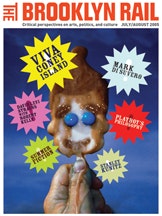Books
Poetry/Mixed Media: The Dead Spectator
“The death of the subject” is a postmodern concept-cum-cliché that, at least 25 years after its introduction to American poetics, still inspires an embarrassment of poems and poetic statements either celebrating its arrival or decrying the pretensions of its proponents. Don’t Let Me Be Lonely, thankfully, is a book that resists the kind of theoretically prescribed writing that has surrounded this schism in poetry, even as it extends this morbid metaphor beyond its original critical context, and into a disquieting personal meditation: That day I find I can’t work, so in the margin of my notebook I write a dialogue:

I thought I was dead.
You thought you were dead?
I thought I was. [...]
You’d let me be lonely?
I thought I was dead.
Like many moments in Don’t Let Me Be Lonely, this one verges on a sort of confessional shtick; the reader is promised a glimpse at he troubled poet behind the “work” of the poem. Within this frame, however, Rankine engages in a tautological wordplay (“I thought I…”) that rejects confession as revelation even as it expresses the confusion of a lyric subject who has somehow cheated death, the death that she herself contrived. For Rankine, the voicing of this confusion is not solely a probing of inwardness: she strives toward the expression of an inner life even as she confronts the social conditions that make autonomy impossible:
My flushing toilet, my hot water, my air conditioner, my health insurance, my, my my—all my mys were American-made. This is how I was alive. Or I wasn’t live. I was a product, or I was like a product, a product of and like Walt Disney’s cell animation—stylishly animated, somewhat comic. I used to think of myself as a fearless person.
Short prose paragraphs like this one make up the bulk of this book: these elements, taken on their own, are more reminiscent of personal journal entries than they are of Rankine’s verse in her earlier volumes, The End of The Alphabet and Nothing in Nature is Private. Though she compliments those prose pieces, to mixed effect, with jarring illustrations (including stills from television news and advertising, and graphics designed by Rankine’s husband John Lucas), there is a certain sense in which Don’t Let Me Be Lonely owes as much to the Robert Lowell of Life Studies as it does to the more formally innovative poets with whom Rankine is usually associated. The most emotionally unsettling episodes in Rankine’s work, however, are not Lowell—like confessions of personal crisis, but rather moments when she reveals a social concern as an aspect of her inner life that has all the bodily power of a private emotion:
[B]ecause I have been waiting for this day without realizing I was waiting, I see the story at first glance: President Mbeki has decided antiretrovirals will be made available to the five million South Africans infected by the HIV virus.
My body relaxes. My shoulders fall back. I had not known that my distress at Mbeki’s previous position had lodged like a virus within me.
Don’t Let Me Be Lonely is the confession of a spectator to the contemporary political and corporate spectacle, but it also opens with an epigram from modernist poet Aime Cesaire, warning both reader and poet to “beware, even in thought, of assuming the sterile attitude of the spectator, for life is not a spectacle, a sea of grief is not a proscenium…” In the context of the tension created by these statements, this act of confession is not a naive attempt to express a “true self” speaking against a “false” society, but rather a strong articulation of a lyric self that speaks despite—and because of—her hyperawareness of her own social and political position. The final words of Rankine’s book express the final importance of speaking out from this paradoxical positon:
Or, Paul Celan said that the poem was no different from a handshake. […] The handshake is our decided ritual of both asserting (I am here) and handing over (here) a self to another. […] This conflation of the solidity of presence with the offering of this same presence perhaps has everything to do with being alive.
In probing the anxiety and empathy she finds in the experience of being a “dead” spectator to her times, Rankine refuses to act as a spectator to her own poetry, and doesn’t allow her readers this comfort, either. Don’t Let Me Be Lonely articulates the unsettling possibility of moving from spectatorship to solidarity, with all the urgency that this task demands. This is vital poetry.




